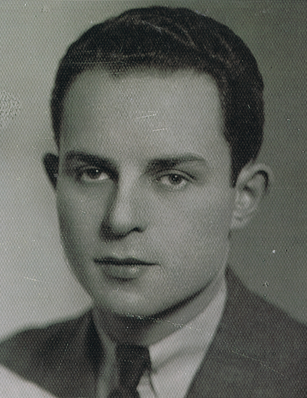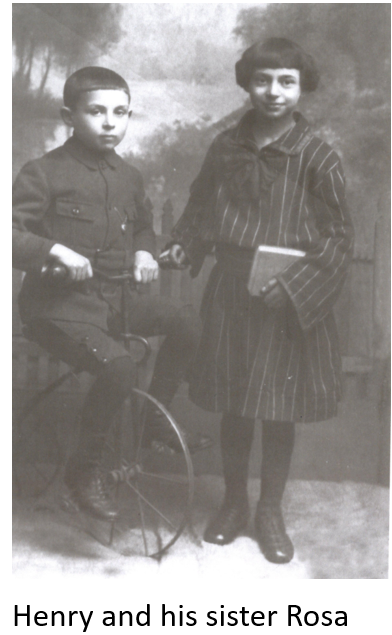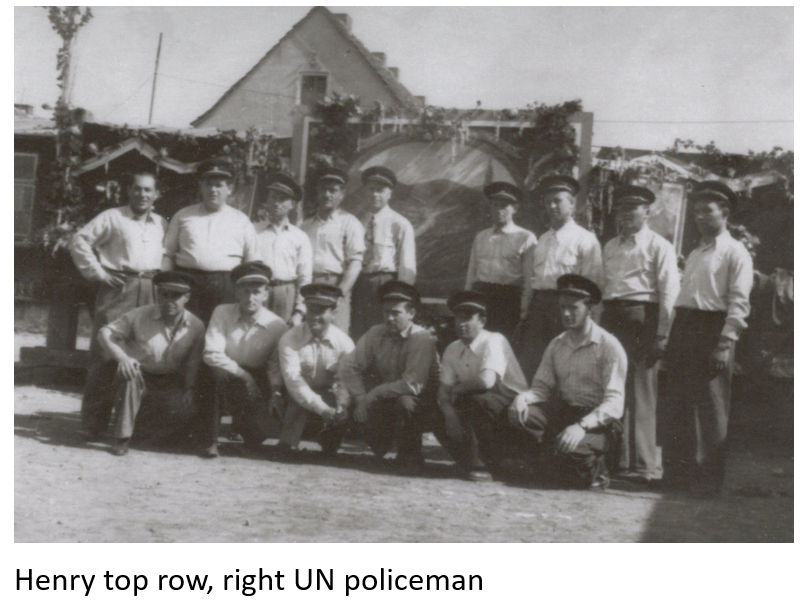Henry Upfall
"Keep a strong Israel. If anything happens in the world, the Jewish people have a place to go."
Name at birth
Gedala Augustowski
Date of birth
04/14/1913
Where did you grow up?
Warsaw, Poland
Name of father, occupation
David,
Had a bar
Maiden name of mother, occupation
Dina Augustowski,
Hebrew Teacher
Immediate family (names, birth order)
Parents, sister and me. My sister was one year older, Ruchel (Rusia) Augustowska
How many in entire extended family?
Large number, including six brothers-in-law, my father-in-law, grandfather and grandmother, uncles, aunts, and cousins.
Who survived the Holocaust?
Only me
No one knew it would be so bad. My mother and sister had been left behind.
My father’s brother was here in Detroit. There was opportunity in Detroit in the 1920s and anti-Semitism in Poland. My uncle had written that life was good in America so my father left Warsaw in 1920, but my mother did not want to leave her parents. My parents divorced. I was raised by my mother and my grandparents on my mother’s side.
Polish boys were beating up the Jewish boys. We needed to learn self defense. My Uncle Yidl Augustowski was a soccer coach for the Maccabees sports club and suggested I join up. At 12 years of age, I trained as a boxer for the group. When I was 18, I was in a boxing match in Talinn, Estonia, and lost use of an eye.
I had a barber shop in Warsaw and was supposed to be married September 6, 1939. After the war started, it was announced on the radio that whoever could carry arms should go to Bialystok in Russian-occupied Poland. I was engaged and I left for Bialystok with my future six brothers-in-law and my fiancée’s father. I then went back to Warsaw to pick up my fiancée and we were married in the Nozek Synagogue. I returned to Bialystok with my wife. My mother and my sister stayed behind in Warsaw. I never knew what happened to them.
The Russians wanted me to go deep into Russia. They took us to Vologda and from there to Posolek, where I worked cutting down trees in the forest. It was terrible in Poselek. We were deep in snow, with little food, and had to chop down trees with a handsaw. People died.
On Yom Kippur, we tried not to work. Some of us bound our hands to make ourselves unable to work that day. I had a “fever.” Each person had different tricks. People would joke that we used to fast one day on Yom Kippur, but in the woods we would fast every day. So my wife and I left Poselek and went to Vitebsk where my in-laws were living. My son Yona (Yale) was born February 1941 in Vitebsk, White Russia.
In 1941, the Russian-German War started, and we had to then evacuate to Tashkent, Uzbekistan, going further and further east. I worked in a large barber shop in Karshi near Tashkent. One day, they called me to the police. I was told to take a Russian passport. I didn’t want it and said that I’m a Polish citizen. So they put me in a cell, a hole in the ground. Bugs ate me up. I got typhus. My wife saw and said to me, “You’re going to fight Stalin?” I took the Russian passport, and I went back to the barber shop.
A Russian soldier came, and they took me into the Russian army. They sent me for training. They kept me two weeks and we went to a school. They loaded us onto the trains, and we went. When I came out, I found that we were going to the Ukrainian front. I was sitting with another refugee, and I said to him, “Moskovitz, do you know where we’re going… to the Shechita (Jewish ritual slaughter of animals).” He said to me, “What can you do?” I said, “I’ll do something.” I had a canteen. I bent down and saw lumber being transported on a train going in the opposite direction, away from the front. I changed my uniform and went to the opposite side.
My brother-in-law had previously gone to Azbest, Russia. The Russians made an agreement with the Poles and the Czechs, to have a few divisions to fight back the Germans. I went to Azbest where my brother-in-law lived and asked him for help. My wife’s brother made suits for the Polish officers. He had a connection and arranged for me to have a Polish passport.
When the war ended, the Russians let us out. I had worked as a barber and was paid in government bonds. When I left, I took the bonds which had then become worthless.
When I went back to Warsaw, the Bricha helped me get to Vienna. Yale was then 4 or 5 years old. Dina was born in Vienna in 1946, after the war. We went to Kassel, Germany, because my in-laws lived there. I worked as a policeman for UNRRA, the United Nations Relief and Rehabilitation Administration, the agency that coordinated relief efforts and managed the Displaced Persons’ camps.
When did you come to the United States?
We came here in 1949 together with Rosa Levinson and her husband, who was paralyzed. Shaarit Haplaytah (organization of Holocaust survivors in Detroit) and the Albert Einstein Lodge of B’nai B’rith started in our home. We saw B’nai B’rith as a good organization and felt we must do something too for the survivors.
How is it that you came to Michigan?
In September 1949, I came to join my father. He owned a bar on Hastings Street called the Silver Line Café. I was robbed twice while working in the bar.
Occupation after the war
Barber Shop
Spouse
Dora (Devorah) Rajf (deceased)
Children
Yale, passed away in 1998, was a plumber and had four children Dina who is a teacher and has two children
Grandchildren
Six grandchildren and eight great-grandchildren.
What do you think helped you to survive?
My strength, my will to live, I wanted to live, I had my wife with me all of the time. No one in the world can understand what we went through except other survivors.
What message would you like to leave for future generations?
Keep a strong Israel. If anything happens in the world, the Jewish people have a place to go.
Interviewer:
Charles Silow
Interview date:
08/10/2010
To learn more about this survivor, please visit:
The Zekelman Holocaust Center Oral History Collection
https://www.holocaustcenter.org/visit/library-archive/oral-history-department/upfall-augustowski-henry-gedalye/
https://www.holocaustcenter.org/visit/library-archive/oral-history-department/upfall-augustowski-henry-gedalye/
Experiences
Survivor's map





